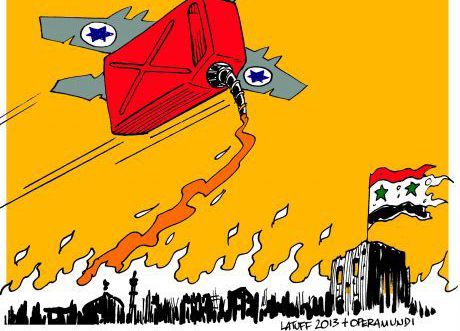Features
You are here
Syria: Israeli attacks create confusion

May 22, 2013
The recent Western-backed Israeli air strikes in Damascus and southern Syria are the latest example of a NATO ally attempting to undermine the genuine revolution in Syria and reverse the Arab Spring.
The Syrian revolution began more than two years ago as an uprising against the repressive and neo-liberal policies of Bashar Al Assad. The economic situation was deteriorating for average Syrians for a number of reasons including declining oil sales and increased desertification. The Syrian revolution was part of the Arab Spring, inspired by Tunisia and Egypt. Assad responded to the uprising with brutality, killing tens of thousands of people, and causing defections in the army and resistance through local coordinating committees.
West's role
The West has wanted to replace Assad with a more compliant regime, and to use the situation to weaken opponents--particularly Hizbollah in Lebanon and the state of Iran, both of which are allies of Assad. Like its interventions Libya and Yemen, the West has tried to hijack the revolution in Syria. There have been threats of "no-fly zones" (ie bombing) or "peace plans" that undermine the revolutinary goals and transfer power to Western-backed elites. But the West's main tactic so far has been indirect military intervention.
The Western-backed repressive Gulf States began to arm sections of the opposition and even brought in some of their own fighters to try and advance the armed struggle. NATO countries began to arm sections of the resistance and to try and create new Syrian National Council that could speak on behalf of the opposition even though it had little credibility with revolutionaries on the ground.
Now the West has escalated its military intervention, unleashing Israel and contemplating direct military intervention. After allegations of chemical weapons use, Canada's foreign affairs minister John Baird was ambiguous about whether Canada would join a war, and there was an emergency debate in the House of Commons.
It is a great tragedy that the Syrian revolution has been turned into this proxy war between these various forces, each with their own aims. NATO wants to use the war as a means of weakening Iran in advance of a potential attack, and to counter Russia which supports Assad for its own regional interests. The Gulf States want to weaken the Shia dominated arc from Hezbollah to Iran to increase their own power in the region. Israel sees a golden opportunity to rid itself of Hezbollah and to continue with its plans to re-occupy southern Lebanon.
The Syrian revolutionaries are stuck in the middle. They immediately condemned the Israeli attack knowing that Israel doesn't have the interests of Syrians at heart but are only using the war to advance their own interests.
Israel's attacks
For the broader anti-war movement in the West the Israeli attack created confusion. For those who believe that the Syrian revolution was all a conspiracy against Iran and Hezbollah in the first place, the Israeli attacks would seem to justify that position. For those who support the revolution, interventions by Israel, NATO and the Gulf States are seen as a huge setback for the revolutionary process as they could undermine the credibility of the opposition, which can now be written off as an Israeli plot.
We shouldn't be confused. Regardless of which position people may hold (and those positions are changing from day to day) the position of the anti-war movement remains the same: oppose intervention from any outside forces.
Solidarity
As socialists we know that no revolutionary process will be a simple conflict. There are dozens of competing groups and states that are vying to control the outcome of the struggle. This is also true of the revolutions in Egypt and throughout the Arab world. Our job is to support the revolutions, and the best way is to mobilize broad opposition to Western intervention--regardless of disagreements on the nature of the Assad regime--so the Syrian people can decide their own future.
If you like this article, register now for Marxism 2013: Revolution In Our Time, a weekend-long conference of ideas to change the world. Sessions include "Permanent revolution: the Arab Spring two years later", "From Cairo to Jerusalem: Palestine and the Arab Spring", and "Libya, Mali and Canadian imperialism."
Section:









